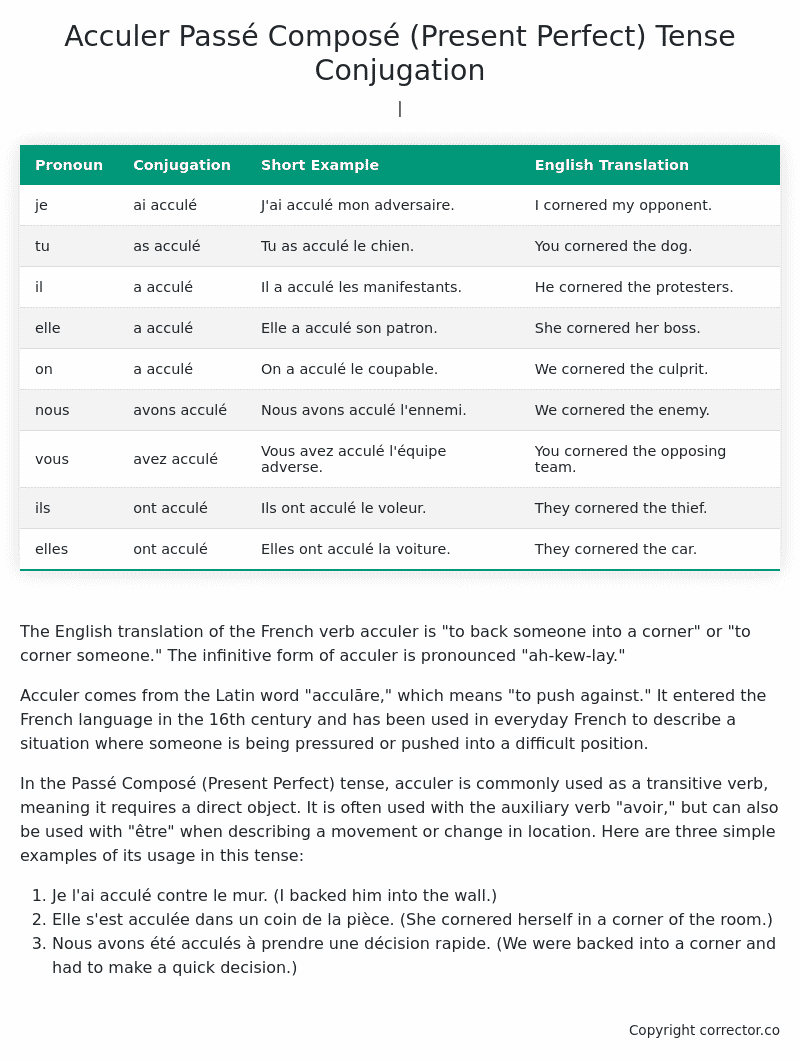Passé Composé (Present Perfect) Tense Conjugation of the French Verb acculer
Introduction to the verb acculer
The English translation of the French verb acculer is “to back someone into a corner” or “to corner someone.” The infinitive form of acculer is pronounced “ah-kew-lay.”
Acculer comes from the Latin word “acculāre,” which means “to push against.” It entered the French language in the 16th century and has been used in everyday French to describe a situation where someone is being pressured or pushed into a difficult position.
In the Passé Composé (Present Perfect) tense, acculer is commonly used as a transitive verb, meaning it requires a direct object. It is often used with the auxiliary verb “avoir,” but can also be used with “être” when describing a movement or change in location. Here are three simple examples of its usage in this tense:
- Je l’ai acculé contre le mur. (I backed him into the wall.)
- Elle s’est acculée dans un coin de la pièce. (She cornered herself in a corner of the room.)
- Nous avons été acculés à prendre une décision rapide. (We were backed into a corner and had to make a quick decision.)
Table of the Passé Composé (Present Perfect) Tense Conjugation of acculer
|
| Pronoun | Conjugation | Short Example | English Translation |
|---|---|---|---|
| je | ai acculé | J’ai acculé mon adversaire. | I cornered my opponent. |
| tu | as acculé | Tu as acculé le chien. | You cornered the dog. |
| il | a acculé | Il a acculé les manifestants. | He cornered the protesters. |
| elle | a acculé | Elle a acculé son patron. | She cornered her boss. |
| on | a acculé | On a acculé le coupable. | We cornered the culprit. |
| nous | avons acculé | Nous avons acculé l’ennemi. | We cornered the enemy. |
| vous | avez acculé | Vous avez acculé l’équipe adverse. | You cornered the opposing team. |
| ils | ont acculé | Ils ont acculé le voleur. | They cornered the thief. |
| elles | ont acculé | Elles ont acculé la voiture. | They cornered the car. |
Other Conjugations for Acculer.
Le Present (Present Tense) Conjugation of the French Verb acculer
Imparfait (Imperfect) Tense Conjugation of the French Verb acculer
Passé Simple (Simple Past) Tense Conjugation of the French Verb acculer
Passé Composé (Present Perfect) Tense Conjugation of the French Verb acculer (this article)
Futur Simple (Simple Future) Tense Conjugation of the French Verb acculer
Futur Proche (Near Future) Tense Conjugation of the French Verb acculer
Plus-que-parfait (Pluperfect) Tense Conjugation of the French Verb acculer
Passé Antérieur (Past Anterior) Tense Conjugation of the French Verb acculer
Futur Antérieur (Future Anterior) Tense Conjugation of the French Verb acculer
Subjonctif Présent (Subjunctive Present) Tense Conjugation of the French Verb acculer
Subjonctif Passé (Subjunctive Past) Tense Conjugation of the French Verb acculer
Subjonctif Imparfait (Subjunctive Imperfect) Tense Conjugation of the French Verb acculer
Subjonctif Plus-que-parfait (Subjunctive Pluperfect) Tense Conjugation of the French Verb acculer
Conditionnel Présent (Conditional Present) Tense Conjugation of the French Verb acculer
Conditionnel Passé (Conditional Past) Tense Conjugation of the French Verb acculer
L’impératif Présent (Imperative Present) Tense Conjugation of the French Verb acculer
L’infinitif Présent (Infinitive Present) Tense Conjugation of the French Verb acculer
Struggling with French verbs or the language in general? Why not use our free French Grammar Checker – no registration required!
Get a FREE Download Study Sheet of this Conjugation 🔥
Simply right click the image below, click “save image” and get your free reference for the acculer present perfect tense conjugation!

Acculer – About the French Passé Composé (Present Perfect) Tense
Formation of the Passé Composé
Set the auxiliary verb with either
Conjugate the auxiliary verb
Add the past participle
Common everyday usage patterns
Narrating Past Events
Sequential Actions
Describing Completed Actions
Interactions with other tenses
Imperfect Tense
Conditional and Future Tenses
Summary
I hope you enjoyed this article on the verb acculer. Still in a learning mood? Check out another TOTALLY random French verb conjugation!


